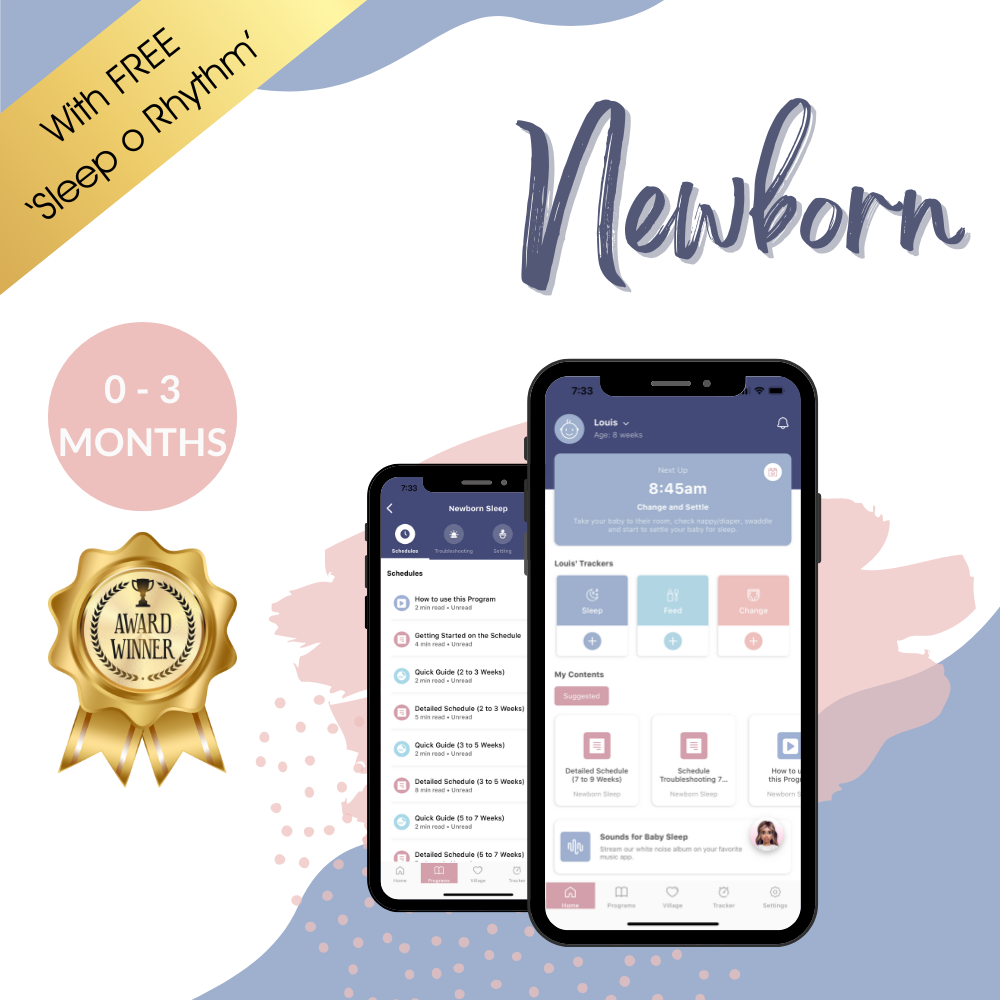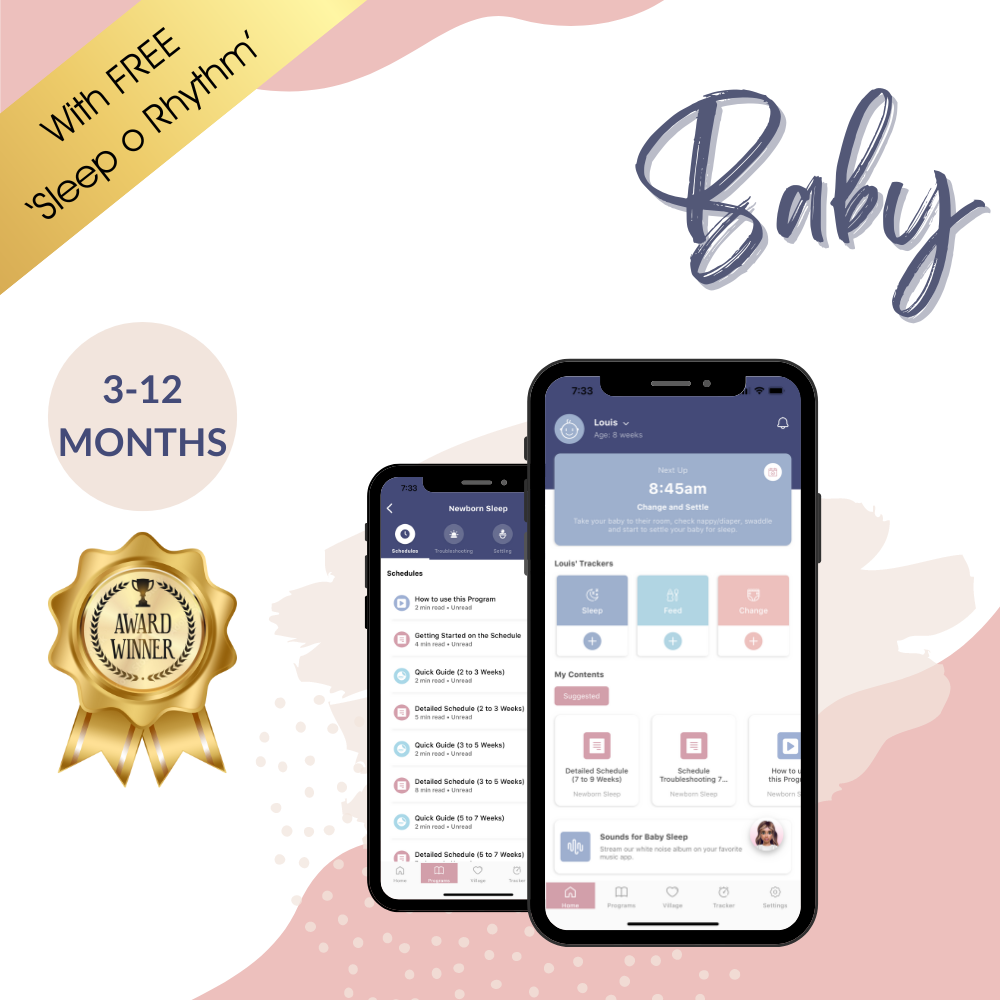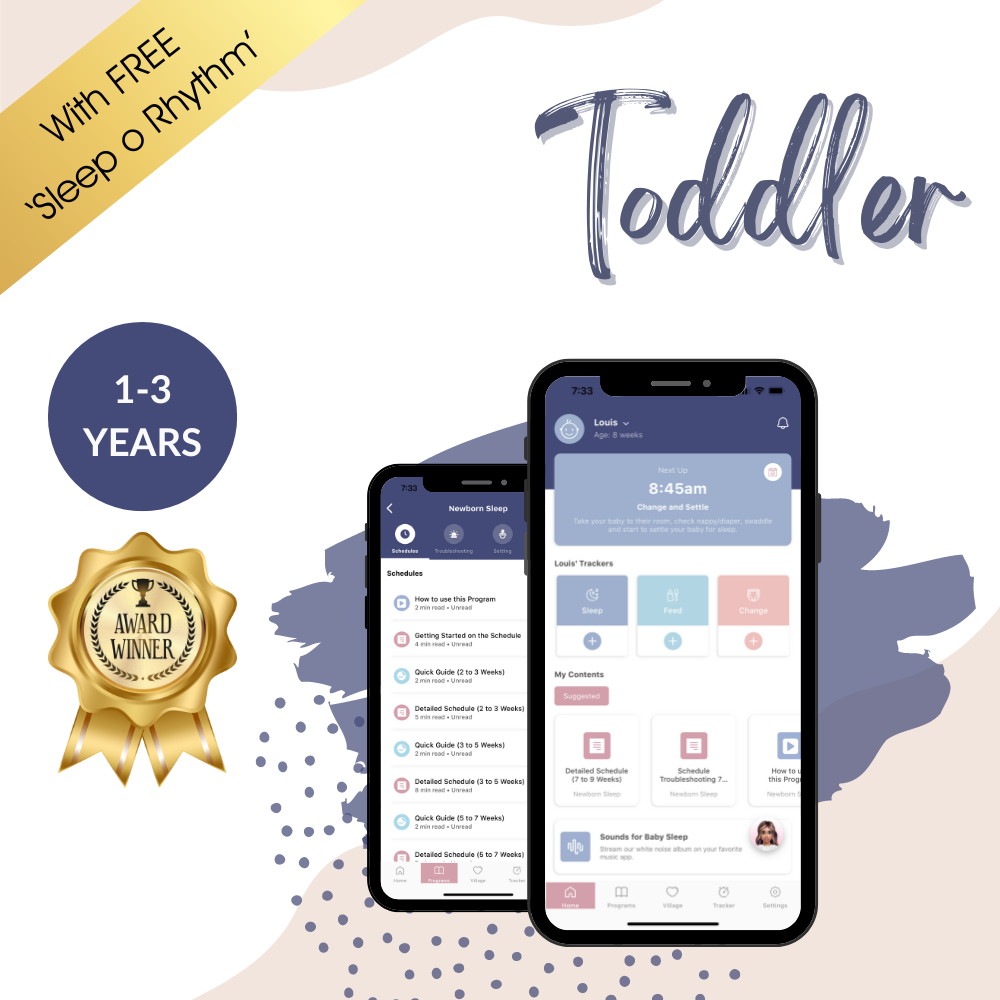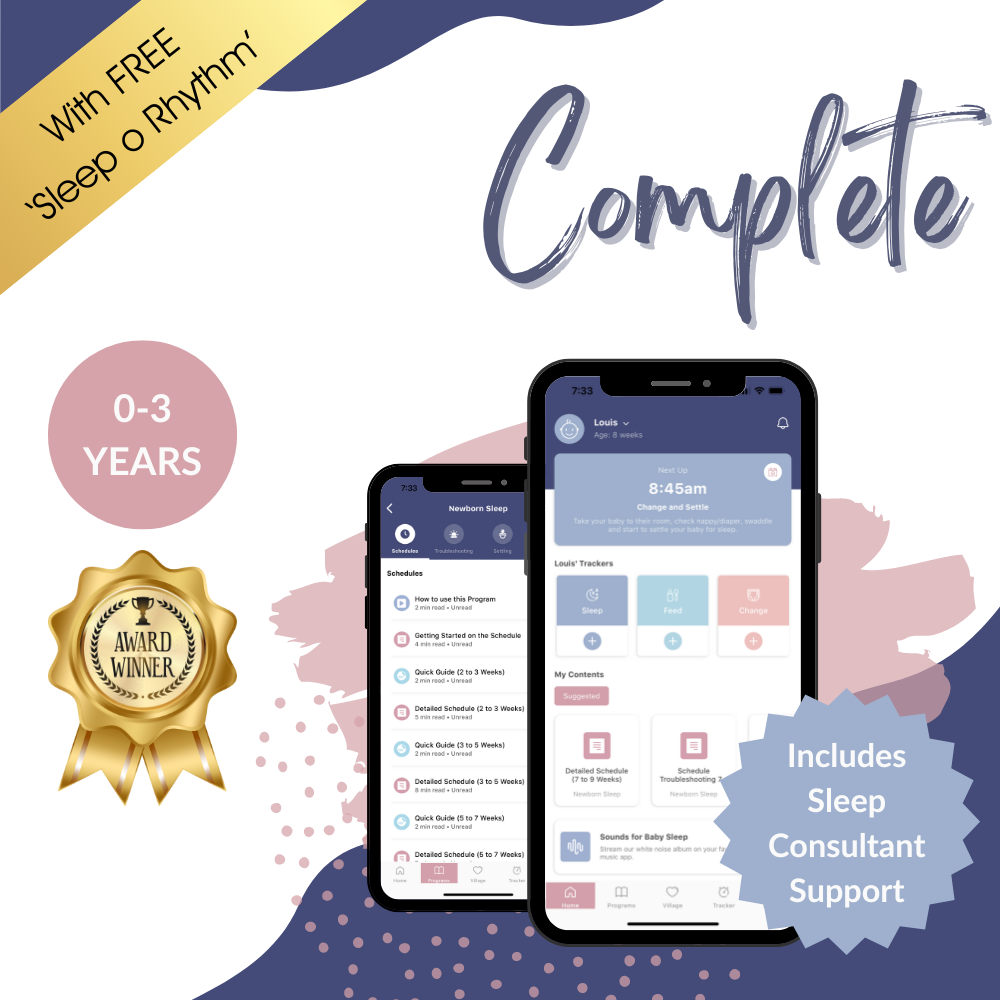
Why Baby Sleep Routines Don’t Suck (and Actually Work)
Unfortunately, the word "routine" holds quite a lot of connotations, some of them negative. In this article, we're going to debunk these negative associations surrounding routines and prove to you why routines definitely don't suck!
In this article:
- What is a routine?
- How do our bodies respond to routine?
- Why do babies and toddlers thrive on routine?
- How can a routine benefit YOU?
Feeling confused about your baby's sleep needs?
Let our sleep experts help you every step of the way. Together we can solve your little one's sleep challenges
Get our Sleep Programs
What is a routine?
Let's start by looking at what a routine actually is...
Routine simply means a set of repeated steps in a process. These are things that would generally happen in the same order every day for several or more days in a row. You might not have realized it but routines actually govern much of our waking hours!
Have a think about your morning routine or your evening or bedtime routine. I know my morning routine starts with waking up, having a shower, doing my makeup, getting dressed, making my kids' lunches, having a cup of coffee, having some breakfast, dropping the kids at school, and starting work. The same steps repeated in the same process every single day and at roughly the same times.
During the week, I wake up at pretty much the same time every day. You will also have a similar routine every morning, I'm sure of it. In the evening or at bedtime, it's no different. You might have a shower, wash your face, brush your teeth, hop into bed, watch some Netflix.
These steps are comforting to us because they're familiar to us. We know the process. We know what happens next. The amazing thing about a set pattern of events like that, is that our bodies unconsciously come to expect the next step in the routine as well...
How do our bodies respond to routine?
If you have the same wake-up time every morning, that effectively sets an alarm in your body clock. Even on the weekends, when your actual alarm might not go off, you will generally wake up at the same time. You can blame the little signal that has triggered in your circadian rhythm because your body is so used to waking at that time!
The same is really evident in schools for students and teachers whose days are very routine and structured due to school bells and meal times. What you notice, and I can say this from first-hand experience having worked as a teacher, is that you start to get hungry right on morning tea time and then again at lunch time because these are the times that you are used to eating Monday to Friday.
Like with waking, your body has locked in a circadian rhythm response so you actually start to feel hungry at the times that you always have food. It's pretty amazing, isn't it? These triggers are called zeitbergers and there has been a lot of research done about them and their effect on our circadian rhythm.
Say goodbye to sleepless nights.
Join over 800,000 families worldwide who are enjoying excellent sleep with our Sleep Programs, created by experts in the field of pediatric sleep.
Get our Sleep Programs
The same happens with our babies and toddlers, and particularly younger babies who are still having milk feeds. While we're never going to tell you not to feed your baby if they're hungry, we have seen a lot of evidence that suggests that babies that are fed on a more regular or routine basis generally feed better because their bodies anticipate feeds at a particular time. As a result, they have longer, fuller feeds and then are more settled and can actually sleep better as a result too!
Why do babies and toddlers thrive on a predictable routine to their day?
When we're talking about routine with babies and toddlers, yes, it definitely applies to having a bedtime routine (i.e. a pattern repeated every evening before bed) but we're also referring to a full daily routine for your little one. We're talking consistent wake-up times in the morning, consistent nap times, consistent meal/feed times... you get the idea!
The reason we say children respond better to having predictable days like this is that your little one has no real sense of time at this young age. The only way they can anticipate what is happening in their day is by coming to know the repeated steps in a pattern. The only way they can keep track of events in their day is because their body comes to anticipate sleep and food at set times.
These regular, set patterns form the framework for their day. We've seen time and time again that this makes babies and toddlers happier, calmer, and when it is time for a sleep, they settle easier and sleep better as a result.
I'm sure you've noticed yourself (I certainly have!) that on the days where you've got lots of appointments or activities on, or if you're on holiday, and you're rushing around dragging your baby or your toddler in and out of the car, to and fro from activities with unpredictable feed and nap times - you reach the end of the day and your baby is totally overwhelmed, grumpy, and crying. Then, a bad night sleep usually follows.
The lack of structure and unpredictability to our children's day really throws them. And to be honest, after a day like that, it's pretty much how I feel as well!
And while people might balk at the idea of being "glued" to the house with their baby stuck to a rigid routine, in reality, it's not actually like that. You can still have a very predictable daily routine without sacrificing outings. Likewise, you can still get out and about during the day without sacrificing your child's sleep as a result...
How does routine benefit YOU?
Let's look now at how a routine for your day can also benefit you as a parent. I'm going to start by explaining a bit about how I found structure really helped with my own children.
I was a high school teacher, and like any other teacher, I was very used to a structured approach to my day, which was governed by school bells and set activities at specific times. I always knew what was coming next. I could look at my timetable and see what class I had and what we were doing. It was very structured and planned and organized. There was no room for confusion or panic, trying to figure out on the spot what was going to happen next!
Then I went into motherhood and quite early on discovered that there was no immediate structure, there was no obvious, natural routine to my day. I actually felt really lost. And my experience of motherhood the first time around suffered as a result.
I didn't know what was coming next in my day, let alone my poor baby. This led to an extremely unsettled baby, who was a sleep nightmare, and pretty unhappy parents as well. I just like I was constantly on the back foot and like I didn't know how to appropriately respond to my baby's needs... because I didn't know what her needs were!
Fast forward to my third baby, after Amanda and I had worked out the best routine (which we still use today in our Sleep Programs!) and WOW, what a difference it made! Having that structure, having that predictability, knowing what came next in my day - it was like looking at my class timetable.
I could anticipate my baby's needs and her wants. I knew exactly why she was crying every time; I just needed to look at the schedule to know that she was due for a nap or due for a feed. That was something that, with my eldest, I hadn't easily been able to determine.
We love routine as parents because:
- We love the freedom that predictability can offer.
- We love knowing exactly when we can go out because our babies will be happy in their awake periods, or we can plan outings to coincide with naps so they will sleep in the car or in the stroller while we're out. We know exactly when our babies are going to need to feed, and we can take supplies with us.
- Our partners, husbands, neighbours or caregivers can take a more active role in our baby's sleep and feeding knowing exactly what is happening each day.
- We feel more in control, with the knowledge of how to best respond to our babies.
The freedom of a routine might sound contradictory, I know, but it's second to none. We've seen time and time again that a good predictable pattern to your day makes for a happier baby and much happier parents!
Let's get your little one's sleep sorted ASAP!Our award-winning Sleep Programs will solve your baby's sleep challenges in no time.
Get our Sleep Programs
Routines absolutely don't suck.
And if your baby or toddler is sleeping poorly right now, what have you got to lose?! Anything is worth a go right?
If you'd like a hand establishing a routine for your baby or toddler, check out our Sleep Programs. You'll get instant access to our customisable, daily sleep and feed schedules; comprehensive troubleshooting notes for when things don't go to plan; gentle settling methods and more!
Our certified sleep consultants are also available in the Little Ones Village to provide personalised advice and solutions for your little one and support you every step of the way.
This wonderful program guides my husband and I through parenthood and helps us work together as to team, working towards the same goal using the same method - rather than us competing with ideas on how best to approach leaps, feeding, teething and settling techniques. Working as a team was extremely important to me, I didn’t want either of us being the ‘lead parent’. We both wanted our daughter to know that her mum, dad, grandma, Memè and childcare staff were able to care for her... not just mum. Throughout our parenting journey, we were bombarded with recommendations, suggestions and unwanted advice... this sent my postnatal depression and anxiety through the roof! I would remind myself ‘block it all out - just stick to the guide - it works!’ This became my mantra. Little Ones is an adaptive guide which offers users tremendous support both directly from administrators and the online Little Ones Village. I continue to recommend this guide to family, friends... and strangers!
-------------
Bibliography
Dewar, G. (2014, January 2). Baby sleep requirements: How much sleep do babies really need? PARENTING SCIENCE. https://parentingscience.com/baby-sleep-requirements/
Dewar, G. (2017, January 2). Newborn sleep patterns: A survival guide. PARENTING SCIENCE. https://parentingscience.com/newborn-sleep/
Dewar, G. (2020, July 17). Baby sleep deprivation: How to tell if your baby isn’t sleeping enough. PARENTING SCIENCE. https://parentingscience.com/baby-sleep-deprivation/
Dewar, G. (2022, December 10). What’s normal? An evidence-based baby sleep chart. PARENTING SCIENCE. https://parentingscience.com/baby-sleep-chart/
Tham, E., Schneider, N., & Broekman, B. (2017). Infant sleep and its relation with cognition and growth: a narrative review. Nature and Science of Sleep, Volume 9, 135–149. https://www.ncbi.nlm.nih.gov/pmc/articles/PMC5440010/
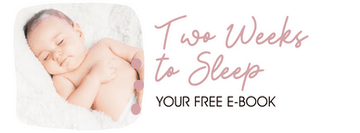
Receive product and services updates, promotional offers and other marketing communications based.


